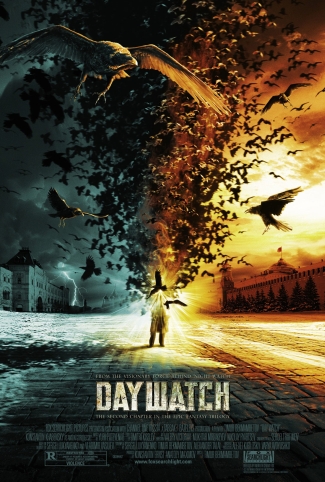
DNEVNOI DOZOR (DAY WATCH)
Russia, 2006, 132 minutes, Colour.
Konstantin Khabensky, Mariya Poroshina.
Directed by Timur Bekmambetov.
In 2004 Night Watch broke box office records in Russia and did quite well in other parts of the world. In 2006, the sequel, Day Watch, did even better. However, it is very Russian in tone and atmosphere, which makes it rather difficult for non-Russians to appreciate.
And, then, it is edited in a way that goes against the more solemn, slowly-paced Russian cinema tradition. Its director comes from commercials and music videos and is a master at the swift cut editing style, so that the film races ahead – and one needs to concentrate on who is who, who is good and who is bad and what is happening. This is a film of visual, effects and technological flair.
Based on a series of novels by S who has adapted them for the screen, the basic plot is the confrontation between good and evil. A parallel from the English-language cinema is the Underworld series.
The film opens with some spectacular scenes of the Mongol chief Tamerlane, his invasions and sieges but, more particularly, his gaining of a piece of chalk (why chalk?), the Chalk of Destiny which one can use to change history and destiny. The vampire powers of darkness are after the Chalk but their leader wants blood spilt by the Night Watch so that apocalyptic destruction can be achieved (quite spectacular when it does).
What follows is a battle between good and evil in the forms of those who are good with special powers (the Night Watch) and the descendants of vampires (the Day Watch). All the activity goes on against a background of seedy Moscow locations as well as a grand hotel with characters moving in and out of zones as they try to outwit each other. It is set in the Communist era since the sunshine ending is in 1992.
If you do not become involved (a risk because of the film’s being difficult to follow at times), then it will be a long two hours. For those on this fantasy wavelength and interested to see how the Russians do it, no worries.
1.The success of the Night Watch and Day Watch films in Russia? Worldwide? The appeal?
2.The adaptation of popular fantasy novels? The Russian settings? Light and dark, good and evil? The traditions of vampires and confronting them? Of vampires living within the ordinary world? The ordinary Russian world – of Moscow? During the communist era?
3.The skill and flair of the special effects, the technology? The editing and pace? The musical score?
4.The uniquely Russian tone of the film? Pace? The contrast with traditional Russian film-making? The parallels with American fantasies? The Russians doing their own thing – and the skills in making a science fantasy extravaganza?
5.The prologue, the connection with Night Watch? The scenes in Moscow, the bus crash? The explanation of the Mediaeval origins of the two forces? The light and the dark? The vampires? The day watch, the night watch? The visualising of the history of Tamerlane? The Mongol invasion? Northern Iran? The issue of the Chalk of Destiny? Tamerlane and his behaviour, the chalk, deaths? His being buried? The 1941 expedition to the tomb? The background of World War Two? The gaining of the chalk, bringing it to Russia?
6.The focus on Anton and Svetlana? Their being part of the night watch? Their powers? Svetlana in training? The attraction between the two? The pursuit of the young murderer? The old woman attacked? Svetlana and her ability to go into the different spheres? Anton unable to? His wanting to rescue her? The relationship between the two, the meal together? Anton and the shape-shifting? Olga and her form – but the real Anton? The masculine behaviour watching the television? Svetlana and her determination to go further? Precipitating a crisis? Anton and his son, wanting to regain him? The confrontation with Zavulon? The support of Geser? The build-up to the party, his son, his being pursued for murder?
7.Svetlana, her embodying the power of light? Her powers? With Anton, love, in Olga’s form? Her pursuit? Her playing into Zavulon’s plan?
8.Zavulon, the powers of darkness, the vampires, living within the ordinary world? The squalid world of Russian poverty? Moscow? The cook, his son, the plan for his son to become human?
9.The presentation of the good forces, the night watch, their work, moving in the world of humans, unseen? The contrast with Zavulon and the evil? Their layers and regions of evil? Possibilities of penetration? Anton and his relationship to both worlds?
10.The woman with the chalk, her power, her infatuation with the son of the cook, his evil intentions? The confrontation, Anton and Svetlana?
11.The party, Anton’s son, Svetlana and her determination to attack, the warning, her not taking any notice? The consequences?
12.The visualising of the apocalypse, its effect on Moscow, on the countryside? The destruction of buildings? The special effects and the visual spectacle? The sense of doom?
13.Moscow, 1992, the collapse of the Soviet empire? Ordinary life in Moscow? Anton and Svetlana passing in the street – and some indication that they might have known each other in another world?
14.The value of this film as following from Night Watch? Preparing for the end of the trilogy?